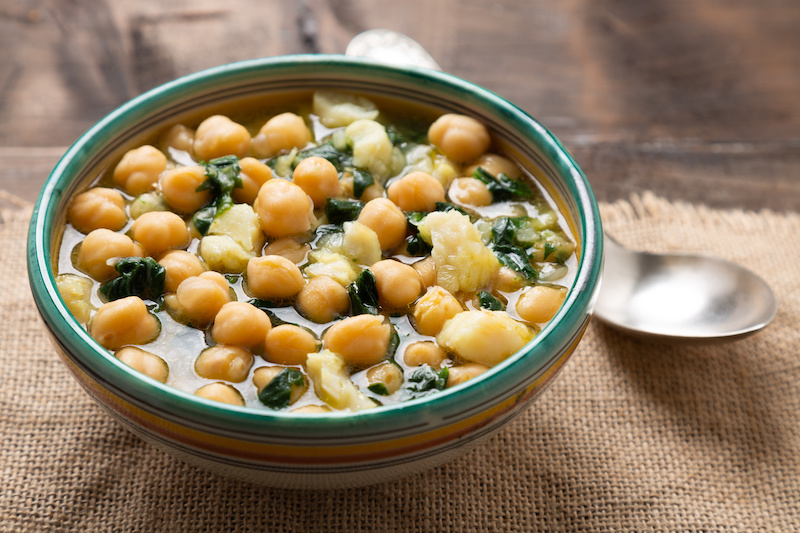Most of my clients who are being supported naturopathically are recommended to incorporate some version of the Mediterranean diet into their lives. We may alter it depending on particular health conditions, allergies, or intolerances however the essence of this scientifically proven way of eating will play an integral part of their naturopathic treatment plan.
Why is it such a healthy way of eating?
The Mediterranean Diet is an incredibly well studied, nutrient-dense way of eating that can be beneficial for so many of today’s chronic illnesses. With multi-decade studies providing thorough documentation of how this diet fares over the lifespan, the Mediterranean diet stands apart among modern diets as one backed by both science and traditional understandings of health. This blog provides you with some further information on what is and isn’t included in the Mediterranean diet, as well as some information on the types of health conditions that can benefit from this way of eating.
What Does a Mediterranean Diet Look Like?
There are numerous countries in the Mediterranean, so a number of versions exist, however some important points to remember are as follows:
- Food is mainly eaten from plant based sources, including fruits and vegetables, legumes, olive oil, nuts, seeds, and wholegrains. An important aspect is that vegetables are the main event on the plate with good fats and meat as more of a side dish.
- Meals are home cooked and local and seasonal foods are used as much as possible. This is not only environmentally friendly but ensures maximum nutrient content.
- Extra virgin Olive oil is the main fat used and is consumed daily and used in cooking.
- Legumes play an important role in the Mediterranean diet.
- Dark, leafy greens play a huge role and should be included in your diet daily as they are rich in antioxidants and have minimal calories.
- Maximum 4 eggs a week is common.
- Fresh fruit is a typical dessert of something sweet is desired.
- Be physically active and drink adequate water (2-3 litres a day).
- Red meat is mostly only consumed a few times every month.
- Whilst the traditional form of wholegrains was bread; managing blood glucose levels are important for most health conditions and as such I recommend that wholegrains come mostly from brown rice, quinoa, oats, thin sandwich wraps such as mountain bread or lavash. Keep pasta to once a week and bread a few times a week with one piece at each sitting.
What’s excluded from the Mediterranean diet:
- Ultra-processed foods like potato chips
- Ready-made meals
- Soft drinks and other sugary beverages
- Frozen foods such as pies, pastries, pizzas and the like
- Deep fried foods
- Processed and refined grain foods such as white pasta and white bread
- Sweets and lollies
- Red meat is very limited (once per week or less, often only once per month)

The Mediterranean Diet Nutritional Profile
The nutritional profile of the Mediterranean diet is outstanding and offers real nourishment, suitable for children and adults throughout the lifespan. When compared to the standard Western dietary patterns typically eaten in places like Australia, the difference in nutritional profile is staggering. The standard Western diet is frequently insufficient in vital nutrients including iodine, vitamin E, magnesium, iron, vitamin A, selenium, vitamin C and folic acid. By contrast, people eating the Mediterranean diet are significantly more likely to be eating sufficient levels of these nutrients (and more) through their diet. People eating the Mediterranean diet are also more likely to have higher plasma concentrations of nutrients such as beta-carotene, folates, vitamin C and vitamin E, and HDL (“good”) cholesterol. Protein intake is higher while carbohydrate intake is lower compared to the standard Western diet, and there is a lower intake of inflammatory saturated and trans fats, instead having higher intake of anti-inflammatory unsaturated fats from foods like olive oil. The Mediterranean diet has low to no intake of processed and pre-cooked foods and is rich in fibre and antioxidants to protect health.
Some of the powerhouse nutrients that are rich in a Mediterranean diet include:
- Omega 3 fatty acids, mostly consumed through fish: vital fatty acids for regulating inflammation in the body and protective against cardiovascular disease, depression, Alzheimer’s disease and more.
- Unsaturated fatty acids, mostly through olive oil.
- Antioxidants, through vegetables, fruit, fresh herbs, and spices
- Fibre, through whole grains, legumes, vegetables, and fruits
- Polyphenols, flavonoids, and other anti-inflammatory compounds found in fruits, vegetables, legumes, nuts, seeds, and olive oil.
The Mediterranean Diet and Disease
Some of the health conditions that studies have found can benefit from the Mediterranean Diet include:
- Asthma
- Breast cancer
- Cardiovascular disease
- Cognitive decline and neurocognitive disorder
- Colorectal cancer
- Depression
- Diabetes
- Erectile dysfunction
- High blood pressure
- Inflammatory bowel disease
- Diverticulitis and proctitis
- Insulin Resistance
- Metabolic Syndrome
- Obesity
- PCOS
- Stroke prevention
- Arthritic conditions
Below is some further information about some of the major conditions that benefit from the Mediterranean diet.
Cardiovascular Disease
In fact, studies have found that the Mediterranean diet has similar efficacy to many standard treatments for cardiovascular disease such as beta blocks and ace inhibitors, without medication side effects. The Mediterranean diet helps to improve blood lipid profiles, reduce high blood pressure, reduce inflammation and oxidation, and reduce blood coagulation, meaning less plaque formation in arteries. Studies show its likely not any one individual food type in the Mediterranean diet that helps to improve cardiovascular health, but rather, the combination and balance of nutrients in the diet that has benefit. Omega 3 fatty acids from fish, antioxidants, polyphenols and fibre from vegetables, fruits and legumes, polyunsaturated fats from olive oil, each confer therapeutic benefits to the cardiovascular system, especially when eaten in a well-balanced diet like the Mediterranean diet.
Metabolic Syndrome
The Mediterranean diet helps with prevention of metabolic syndrome and protects against many of the risk factors of metabolic syndrome, such as waist circumference, blood glucose, blood lipids, and blood pressure.
Insulin Resistance and Diabetes
Studies have shown that the Mediterranean diet can help improve insulin sensitivity for those with diabetes and insulin resistance more effectively than other dietary plans. The high content of polyphenols and unsaturated fatty acids from foods such as olive oil, fruits and vegetables, and nuts helps to improve the body’s insulin and glucose levels. For those at risk of developing diabetes, the Mediterranean diet can reduce the risk by as much as 83%.
Non-Alcoholic Fatty Liver Disease
NAFLD is a serious condition associated with insulin resistance which can lead to serious liver complications in the long term. The Mediterranean diet has been shown to improve liver function and reduce complications of NAFLD by reducing inflammation, improving insulin resistance and blood glucose control, and reducing oxidative stress.
Neurocognitive Disorder and Dementia
An analysis of 22 clinical studies found the Mediterranean Diet was consistently associated with a lower risk of a number of neurological and neurocognitive disorders, including cognitive impairment, dementia, and even Parkinson’s disease.
Mental Health
A 20-year cohort study published in 2021 followed nearly 50,000 Swedish women and found adherence to the Medi diet reduced the risk of depression in later life. A recent review of 37 studies has found that the high polyphenol content of the Mediterranean diet is likely to help reduce the risk of developing depression, as well as helping to relieve depressive symptoms.
Inflammatory Bowel Disease
Inflammatory bowels diseases such as Crohn’s disease and ulcerative colitis also benefit from the Mediterranean diet. This is because this diet can help to reduce inflammation, improve liver function, and blood lipids, reduce symptoms, and improve quality of life in IBD patients. The foods in this diet feed healthy species of bacteria which in turn produce butyrate and other healing substances which heal the digestive system.
PCOS
Research shows the Mediterranean diet can be useful for PCOS by helping reduce insulin resistance, improve blood lipid levels, and even help to regulate the menstrual cycle. One of the ways it is able to assist with PCOS is through the high level of the antioxidant compound resveratrol, found in foods such as grapes, berries and red wine.
For a thorough and investigative naturopathic approach to your health condition or wellness goals, please book an appointment with me via the contact tab on my website here or email me on [email protected].

References
Bayes, J., Schloss, J., & Sibbritt, D. (2020). Effects of polyphenols in a Mediterranean diet on symptoms of depression: A systematic literature review. Advances in Nutrition, 11(3), 602–615.
Castro-Quezada, I., Roman-Vinas, B., & Serra-Majem, L. (2014). The Mediterranean diet and nutritional adequacy: A review. Nutrients, 6(1), 231–248.
Chicco, F., Magri, S., Cingolani, A., Paduano, D., Pesenti, M., Zara, F., Tumbarello, F., Urru, E., Melis, A., & Casula, L. (2021). Multidimensional impact of Mediterranean diet on IBD patients. Inflammatory Bowel Diseases, 27(1).
Guasch-Ferre, M., Merino, J., Sun, Q., Fito, M., & Salas-Salvado, J. (2017). Dietary polyphenols, Mediterranean diet, prediabetes, and type 2 diabetes: A narrative review of the evidence. Oxidative Medicine and Cellular Longevity, 2017.
Mirabelli, M., Chiefari, E., Arcidiacono, B., Corigliano, D. M., Brunetti, F. S., Maggisano, V., Russo, D., Foti, D. P., & Brunetti, A. (2020). Mediterranean diet nutrients to turn the tide against insulin resistance and related diseases. Nutrients, 12.
Papadaki, A., Nolen-Doerr, E., & Mantzoros, C. S. (2020). The effect of the Mediterranean diet on metabolic health: A systematic review and meta-analysis of controlled trials in adults. Nutrients, 12(11).
Psaltopoulou, T., Sergentanis, T. N., Panagiotakos, D. B., Sergentanis, I. N., Kosti, R., & Scarmeas, N. (2013). Mediterranean diet, stroke, cognitive impairment, and depression: A meta-analysis. Annals of Neurology, 74(4), 580–591.
Widmer, R. J., Flammer, A. J., Lerman, L. O., & Lerman, A. (2015). The Mediterranean diet, its components, and cardiovascular disease. The American Journal of Medicine, 128(3), 229–238.
Yin, W., Lof, M., Chen, R., Hultman, C., Fang, F., & Sandin, S. (2021). Mediterranean diet and depression: A population-based cohort study. International Journal of Behavioural Nutrition and Physical Activity, 18.










